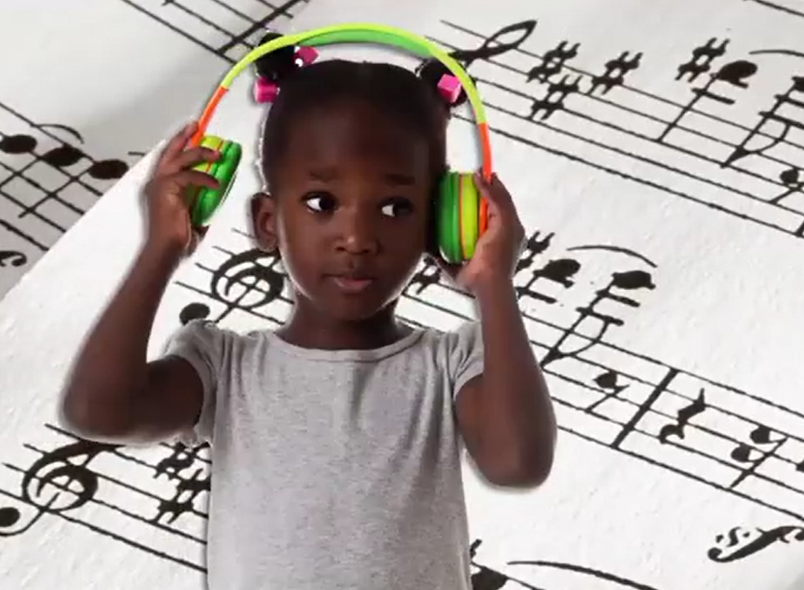Oh sorry! I didn't see you there.
噢,对不起!我刚没看见你们在这儿。
We were having a dance party because we heard some awesome music and just couldn't help but dance.
我们正在举办舞会,因为我们听到了一些美妙的音乐,忍不住跳起了舞。
Does that ever happen to you?
你曾经这样过吗?
Or does beautiful music ever give you the chills?
美妙的音乐让你颤抖?
Or make you feel happy or sad?
或让你感到快乐或伤心?
Sometimes music makes me cry... and sometimes it makes me and Squeaks feel like dancing!
有时音乐让我们哭泣...有时它让我和吱吱感觉像跳舞一样!
When we listen to music, it's not just our ears that are listening, it's our whole bodies!
我们听音乐时,不只是耳朵在听,整个身体都在听!
When you listen to music you love, it can make your body relax,
你听喜欢的音乐时,它会让你的身体放松下来,
and very emotional music can give you the chills.
非常情绪化的音乐会让你颤抖。
Sometimes listening to music will make your body send more blood to your leg muscles, making you ready to dance!
有时听音乐会让你的身体运送更多的血液到腿部肌肉,让你准备跳舞!
It all starts with the brain.
这一切都从大脑开始。
When your ears hear music and your brain responds, your brain starts reacting and gets excited!
你的耳朵听到音乐,大脑作出反应,变得兴奋起来!
And it sends messages to other parts of your body to react, too!
它会将信息发送到身体的其他部位,也作出反应!
But why do our brains react to music in the first place?
但为什么是你的大脑先对音乐做出反应呢?
Well, it has to do with patterns of notes, or little bits of music that you hear over and over again, and expectations.
它与音符的节奏或是你一遍又一遍听的小段音乐和期望有关,
Thinking you're going to hear one bit of music, and then hearing something different!
想想你听一段音乐,不久就能听出不同来。
Which makes your brain surprised.
这会让你的大脑感到惊奇。

Music is made up of different notes.
音乐是由不同的音符构成的,
And each song you hear is built around a scale:
你听到的每首歌都是围绕一个音阶展开的:
eight notes that all go together, like a little note family.
八个音符一起,就像一个小小的音符家族。
You might've heard people call them... do-re-mi-fa-sol-la-ti...!
你可能听人们称它们为do-re-mi-fa-sol-la-ti...!
Nice high note, Squeaks!
吱吱,不错的高音!
So that top note and bottom note, the ones we sometimes call "Do", that's called the tonic.
这就是高音和低音,我们叫做“Do”的音,就是基音。
It's the note your brain waits and waits to hear.
它就是你的大脑等着听的音符。
It's the most important note in the whole song!
它是整首歌里最重要的音符!
Like in the song "Mary Had a Little Lamb"!
比如“玛丽有一只小羊羔”这首歌里,
Right there, on the word "snow"! That's it! That's the tonic. White... as... snow.
就是这儿,“snow”这个词,就是它!它就是基音。白如雪。
Most songs we know come back to that little note, the tonic.
我们知道的很多歌都要回到小小的音节,也就是基音上。
We're pretty used to that, we expect it.
我们已经习惯了,我们期待它。
And the composer, the person who wrote the song, they know that we're expecting the tonic.
写歌的作曲家知道我们期待基音,
And that until we hear it,
在我们听到它之前,
our brains are going bananas trying to figure out what's going on, and when the tonic is coming.
我们的大脑都在发疯,试图弄清楚到底发生了什么,什么时候基音出现。
As long as we keep getting surprised, our brains keep getting excited, and our bodies keep reacting to the music.
只要我们一直感到惊奇,我们的大脑就会一直兴奋,我们的身体就会随音乐反应。
We're waiting for the big moment when the music switches from being unstable and all over the place, to the tonic.
我们正等待着重要时刻,即音乐从到处不稳定的状态切换到基音的时刻。
That big moment is called the resolution.
这个重大时刻被称为过渡。
We just know the resolution will come eventually!
我们知道过渡最终会来!
But in the meantime, we keep listening!
但与此同时,我们一直在听!
And the composer is playing a little game with us, getting us more interested in the music.
作曲家和我们玩了一场小游戏,让我们对音乐更感兴趣。
They're making us wait for the big moment, holding back the tonic until the very, very end.
他们让我们等待重要的时刻,把基音放到了最后一刻。
So the next time you're listening to a song,
所以下次你听歌时,
you'll know that you're listening with your ears, but your brain is listening, too!
你就知道不仅你的耳朵在听,你的身体也在听!
While the music is telling us stories and stirring up all kinds of emotions inside us,
音乐告诉我们故事,激起我们内心的各种情感,
our brains are busy listening to the patterns, getting excited, and making the rest of our bodies tap along.
我们的大脑正忙于倾听这些节奏,变得兴奋,并让我们的身体也跟着动。
Thanks for joining us!
感谢您的收看!
If you want to keep learning and having fun with Squeaks and me, hit the subscribe button,
如果你想继续学习,与我和吱吱共度美好时光,就点击订阅键吧,
and we'll see you next time, here at the Fort!
我们下期见,沃斯堡等你哦!
And happy listening!
好好听音乐吧!












